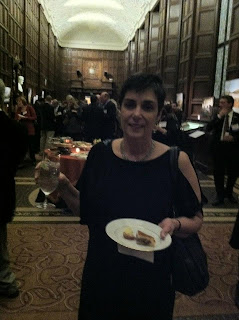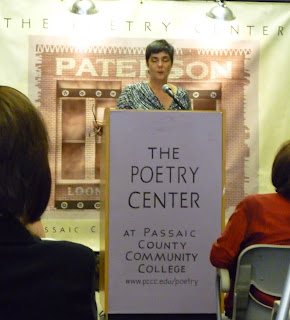It goes without saying the discussion as to the "usefulness" of poetry has been going on for some time now. I might venture to say we could look all the way back to the Greeks and find the kind of criticism of the entire discipline that, in a nutshell, goes something like this: Poetry is useless.
But if you really believe that you wouldn't be reading this. And if it were really true--that poetry is, indeed, useless and therefore pointless-- how is it that poetry has been around all these thousands of years?
The corollary to the "useless-pointless" discussion is the ideas that poetry and poetry readings are "boring."
I could say here how I have given reading all over the United States--and have attended readings given all over the country--and I always look into the faces of the audience. I do not see bored, restless people who choose to spend their time in useless and pointless endeavors because of some deep seated need to waste a Friday night or Saturday afternoon--or what have you...
no, I see people who look like they need something that only the poetic experience can give them.
I will, admit, however, that I often see
confused people. Those who have not been taught how to attend a poetry reading. Those who don't know what to expect or how to act. Those who may have been embarrassed or shamed by some ill educated junior high school teacher who --as Billy Collins has so famously written--insisted the class "torture a meaning" out of of a poem. Or worse--this mythological teacher we have all encountered at some point in our lives--the one we had to learn how to survive with all the courage of one of Victor Hugo's character's in
Les Miserables--forced us to scan a poem but never taught us how find joy in the reading and hearing of a poem.
But I digress. As usual.
Here's how to attend a poetry reading in order to enjoy it.
1) Forget what people tell you about poetry. It is the first and most profound of the "People's Art." Therefore you have a right to be there. So relax and let the poetry wash over you.
2) Poetry readings are not created equal. Like all public performances--are sometimes great experiences, sometimes not so much. Understand that. After a while and with some experience, you will know if a poet is giving a reading that is phoned in or if the poet is simply not a gifted reader. Or if the poet reads so theatrically that the reading obscured obvious flaws in the writing. Or if the poet transports you--and the entire audience--to another dimension. Then you will know the word "good" will never, ever be enough to describe an experience like that.
3) Come prepared. When you are familiar with a poem or a poet, the experience of a reading becomes so much deeper. Try to read a few poems before you attend. Don't worry if you "get" the poems. Just read one or two and then see what happens
inside you when you hear the poet read the same poems.
4) There is an etiquette to follow at poetry readings--just like at football games, pool halls, the symphony and public debates; there is an "understanding" on how to behave. Typically, audience members do not applaud after each poem is read. It is traditional to only applaud at the end of the reading. Think of this as listening to the symphony--the whole is greater than its parts. I have, however, seen a few poets who do not want this kind of response to their work. They like it when the audience seems to not be able to
contain themselves. Okay, then, Go with it. However, I just have to say, I don't like this practice as it is encouraged by such poets as I think it diminishes the performance. I find it distracting, unnecessary and a bit too much.
5) Which brings me to the next point--a good poetry reading is a performance. No eating while the poet is reading. No texting. No passing notes. Behave yourself. The poems speak to one another and you need to be quiet, sit still and hear the "conversation." Really, be polite. Or don't come at all.
6) Poetry readings get better the more you attend and your understanding of the art form grows. This will happen.
7) After a reading, buy a book. Or buy a book beforehand. Support the poetry. Support the art form. Most poets do not make any money from their books. In fact, it often costs the poet money to promote his or her books. So, if you think poetry is an important part of the human experience, try and buy a book if at all possible.
8) After the reading, the poet will be in a kind of post-reading fog. So when you get your book signed by the poet, remember to be kind....write your name on a piece of paper so the poet doesn't have to think about how to spell it.
9) After-the reading, do not shove your own poetry into the hands of the poet who has just
given his or her all to the crowd. This is not about you or your work.
If you have only come to the poet's reading because there is an open mic reading, that is fine. But think about how this poet might teach you something about poetry. Really, you should consider this a free lesson in how to write poetry. (or, in some cases, how
not to write poetry). Be respectful. Be open. If you like the poet's work, consider writing a brief review on Amazon.
10) There is simply nothing like participating in a great poetry reading. Nothing. Next time you go, bring some friends.


.jpg)















